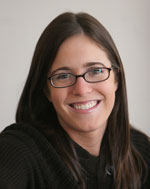Twenty Something / Christina Capecchi
‘Unexpected
harmonies’ in
Mother’s Day
requiem
 Auditioning for Patty Connors’ choir was a prelude to Russ’s audition to be her husband. She said yes to the mild-mannered tenor twice.
Auditioning for Patty Connors’ choir was a prelude to Russ’s audition to be her husband. She said yes to the mild-mannered tenor twice.
They have enjoyed 15 years of marriage and music, raising a daughter and a son while chairing their respective departments at St. Catherine University in St. Paul, Minn.—she in music, he in theology.
Last March came the news that Stage 4 colorectal cancer had seized Russ’s body, bringing with it a two-year life expectancy. He kept singing in Patty’s choir, savoring each measure.
This March came the news that the chemotherapy wasn’t halting Russ’s cancer. His life expectancy dropped to six months.
Russ has lost hair, energy, weight and, most painful of all, the ability to sing.
When it came time for Patty’s choir to perform the premiere of a requiem by Jocelyn Hagen called “Ashes of Roses,” Russ knew he would have to sit it out.
He wrote about the Mother’s Day concert on his CaringBridge journal. “I have a prayer for Patty about this, one I have been praying for a while—I pray that she will so lose herself in this beautiful music, get so involved in making something beautiful happen, that for the hour or so that it takes to perform, she can give away all the anxieties and worries that she is living with so bravely.”
Bravely, indeed—56 and facing what was likely her last Mother’s Day with her husband, preparing to conduct a requiem with Mass parts for the dead.
Patty opened her heart to the rainy Sunday, receiving gifts over breakfast and attending the 8:30 a.m. Mass at Holy Spirit Church before slipping away to study the seven-movement score.
At 3 p.m., she stepped onto the stage, wearing black and smiling, and she wished the audience a happy Mother’s Day. She would have selected another Sunday to perform, but that is what was available and there she stood, poised and elegant.
There Russ sat, son at his side, head in his hand, eyes on his wife. She raised her baton and ushered in a low tremble from the cello. Soon the choir was chanting, “Requiem aeternam dona eis, Domine”—“Grant unto them eternal rest, Lord.”
Conducting the requiem consumed Patty and answered Russ’s prayer. “It’s thrilling to work with so many musicians,” she told me the next morning. “I did lose myself in the music.”
Patty described the requiem’s “tricky rhythms and unexpected harmonies.” The orchestra rarely plays in the same harmony as the choir, resulting in dissonance. The meter and tempo shift often, and even within the same meter, she said, you have got “triplets and duplets and quadruplets and septuplets to negotiate.” Just as soon as a pattern is established, it changes.
For Patty, the requiem’s joy is tethered to its complexity. “It demands such absorption and rewards one for that,” she said.
What a brave response to life’s changing patterns—inhale deeply, dig in your heels and listen for unexpected harmonies.
One of Patty’s favorite movements in the requiem is the last one, “Lux Aeterna,”—eternal light. It begins with a trumpet fanfare, “like a joyous march into heaven,” she said, and then the upper strings dive in—first violins, second violins, violas, each group divided in half. “That makes six different parts playing a sixteenth note, and each of them begins an eighth note apart. It’s very challenging, but it creates a shimmering effect.”
When those bows flew, you could feel an ascent. Russ lifted his head, and Patty leaned forward, unafraid.
(Christina Capecchi is a freelance writer from Inver Grove Heights, Minn. She can be reached at www.ReadChristina.com.) †
 Auditioning for Patty Connors’ choir was a prelude to Russ’s audition to be her husband. She said yes to the mild-mannered tenor twice.
Auditioning for Patty Connors’ choir was a prelude to Russ’s audition to be her husband. She said yes to the mild-mannered tenor twice.